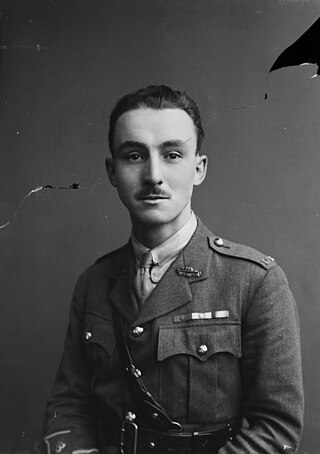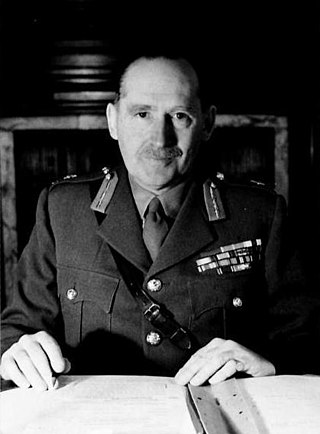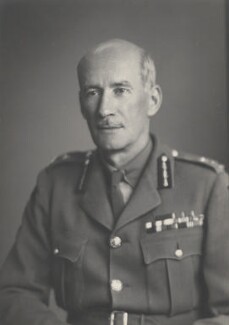
The Most Excellent Order of the British Empire is a British order of chivalry, rewarding contributions to the arts and sciences, work with charitable and welfare organizations, and public service outside the civil service. It was established on 4 June 1917 by King George V and comprises five classes across both civil and military divisions, the most senior two of which make the recipient either a knight if male or dame if female. There is also the related British Empire Medal, whose recipients are affiliated with, but not members of, the order.

The Duke of York's Royal Military School, more commonly known as the Duke of York's, is a co-educational academy with military traditions in Guston, Kent. Since becoming an academy in 2010, the school is now sponsored by the Ministry of Defence, and accepts applications from any student wishing to board. Before 2010, only those students whose parents were serving or had served in the armed forces were eligible.

Air Vice Marshal Francis Hubert (Frank) McNamara, was an Australian recipient of the Victoria Cross, the highest decoration for valour in the face of the enemy that can be awarded to a member of the British and Commonwealth forces. Serving with the Australian Flying Corps, he was honoured for his actions on 20 March 1917, when he rescued a fellow pilot who had been forced down behind enemy lines. McNamara was the first Australian aviator—and the only one in World War I—to receive the Victoria Cross. He later became a senior commander in the Royal Australian Air Force (RAAF).

Brigadier Milton Fowler Gregg, was a Canadian military officer and a First World War recipient of the Victoria Cross, the highest award for gallantry in the face of the enemy that can be awarded to British and Commonwealth forces. In later life, he was a Member of the Canadian Parliament, cabinet minister, academic, soldier and diplomat.

Brigadier Hector Cyril Daniel was a South African military commander. He served in the Royal Air Force in World War I, becoming an ace with nine aerial victories, and joined the South African Air Force in 1923.
Air Vice Marshal Sir Oliver Swann, was a British military commander who was a leading figure in the Royal Naval Air Service and senior commander in the Royal Air Force during the first half of the 20th century.

Brigadier Hugh Kenyon Molesworth Kindersley, 2nd Baron Kindersley of West Hoathly was a British Army officer, businessman, banker. His father was businessman Robert Kindersley, 1st Baron Kindersley GBE.
Air Chief Marshal Sir John Wakeling Baker, was a senior commander in the Royal Air Force in the mid-20th century.
Major General Logan Scott-Bowden, was a British army officer. A Royal Engineers officer during World War II, he was the first commander of the Ulster Defence Regiment. Retiring as a major general in 1974, he served as the colonel-commandant of the Royal Engineers from 1975 to 1980.
General Sir John Antony Jervis Read, was a senior British Army officer who served as Quartermaster-General to the Forces from 1969 to 1973. He was awarded the Military Cross (MC) for gallantry during the campaign against the Italian Army in East Africa in 1941 and the Distinguished Service Order (DSO) for his leadership and gallantry whilst in command of 1 Gambia Regiment in Burma in March 1945, during the Second World War.

General Sir Daril Gerard Watson, was a senior British Army officer who saw service during both the First and Second World Wars.

Lieutenant-General Ronald Morce Weeks, 1st Baron Weeks was a British Army general during the Second World War.

Major-General Joseph Aloysius Baillon was a senior British Army officer who served in both World War I and World War II.

Major-General Clifford Thomason Beckett CB, CBE, MC was an officer of the British Army who had a distinguished military career which spanned almost thirty-five years, including service in the two world wars.

Major-General Sir Horace Eckford Roome was an officer of the Royal Engineers.
Lieutenant General Inderjit Singh Gill, PVSM, MC was a general officer in the Indian Army. He was the officiating Director of Military Operations (DMO) of the Indian Army during the Bangladesh Liberation War. He retired in 1979 after serving as the Western Army Commander.
Major General Ronald Dare Wilson, was a senior British Army officer, author, and park warden. He was decorated during World War II, commanded 22 Special Air Service Regiment in the early 1960s and ended his military career as Director of Army Aviation. He was instrumental in introducing attack helicopters and high-altitude military parachuting to the British military. In retirement, he served as the National Park Officer of Exmoor National Park.
Vice-Admiral Eric William Longley-Cook, was a Royal Navy officer.
Lionel Frederic Ellis CVO CBE DSO MC was a British Army officer and military historian, author of three volumes of the official History of the Second World War.
Lieutenant-General Frederick Vavasour Broome Witts was a senior British Army officer.











